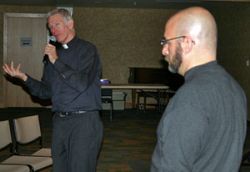?The Power of Forgiveness' previews in Park City

PARK CITY — One of the documentary films shown in Park City last week didn’t share in the glamor of the Sundance Film Festival. Instead of being shown on the silver screens Martin Doblmeier’s "The Power of Forgiveness" was previewed Jan. 21-23 on the modest screen of Park City Community Church. Each evening, interfaith discussions on forgiveness followed the showings. For the second time in four years Doblmeier’s Journey Films has premiered a film in Park City churches at the height of the Sundance Film Festival. In 2003, Doblmeier premiered "Bonhoeffer," which later went into limited release. "In 1995, 50 scientific studies were done on the issue of forgiveness," said Doblmeier in an interview with the Intermountain Catholic. "In 2005, more than 1,000 studies were being done. Forgiveness is part of our faith tradition, but now we are learning that forgiveness has practical and positive health implications, it enhances our quality of life, and it relieves stress and tension. Forgiveness is good for the body, the mind, and the spirit." The preview shown in Park City was a rough cut of the documentary, in which Doblmeier examines the virtues of forgiveness in our current society, split politically over the war in Iraq, and still angry and wounded from the Sept. 11, 2001 destruction of the World Trade Center, attack on the Pentagon, and loss of a plane in a Pennsylvania corn field. "This is a documentary, but it’s a very personal film," Doblmeier said. "We’re at war, and we’re not in a forgiving mentality. For many people, forgiveness has been lost from our culture. The reality is that not all stories have a happy ending." "The Power of Forgiveness" consists of seven short stories of wounded people struggling with the concept of forgiveness. Some succeed in achieving forgiveness. Others do not. "I wanted to show how central forgiveness is to healing, and how little attention is paid to forgiving those who have hurt us," said Doblmeier. Central to the film, he said, is the need for self-forgiveness. "You have to live with yourself. You have to come to grips. But holding grudges toward yourself gets in the way of true healing. Forgiving yourself can bring about healing in a profound way." Doblmeier’s point is made dramatically in the story of one woman whose son, a New York City firefighter, was lost in the collapse of the World Trade Center. Six year later, her anger is deep and seething. Only as the documentary progresses do we learn that one of the real bases of her anguish is how she treated her son before his death. "I wanted ‘Forgiveness’ to have a strong faith component," Doblmeier said. "In truth, we filmed and could have featured 50 stories. It would have been epic. The film could also have gone another direction – into the anger and away from forgiveness. With the interfaith discussions after each showing, we are letting faith and forgiveness drive the discussion. "The pastors, rabbis, and other religious leaders in Park City have been just great," Doblmeier said. "They have always welcomed us and have been so open to our work." Segments of "Forgiveness" feature Elie Weisel, Nazi concentration camp survivor, Nobel Peace Prize Winner, and until 1986 chairman of the president’s Commission on the Holocaust; Belfast, Northern Ireland, and people caught up for generations in the "troubles" there; the Pennsylvania Amish community after the October school shootings; and exiled Vietnamese Buddhist Leader Thick Nhat Hanh. By choosing not to enter his films in the Sundance Film Festival, but showing them at alternative sites like churches, Doblmeier said it takes the emphasis off the process of film-making and focuses it on faith and spirituality. Pastor Bob Kaylor of Park City Community Church said "The Power of Forgiveness" is not a film based on one particular religion, "but on the broader issue of forgiveness for all of us."
© Copyright 2025 The Diocese of Salt Lake City. All rights reserved.

Stay Connected With Us